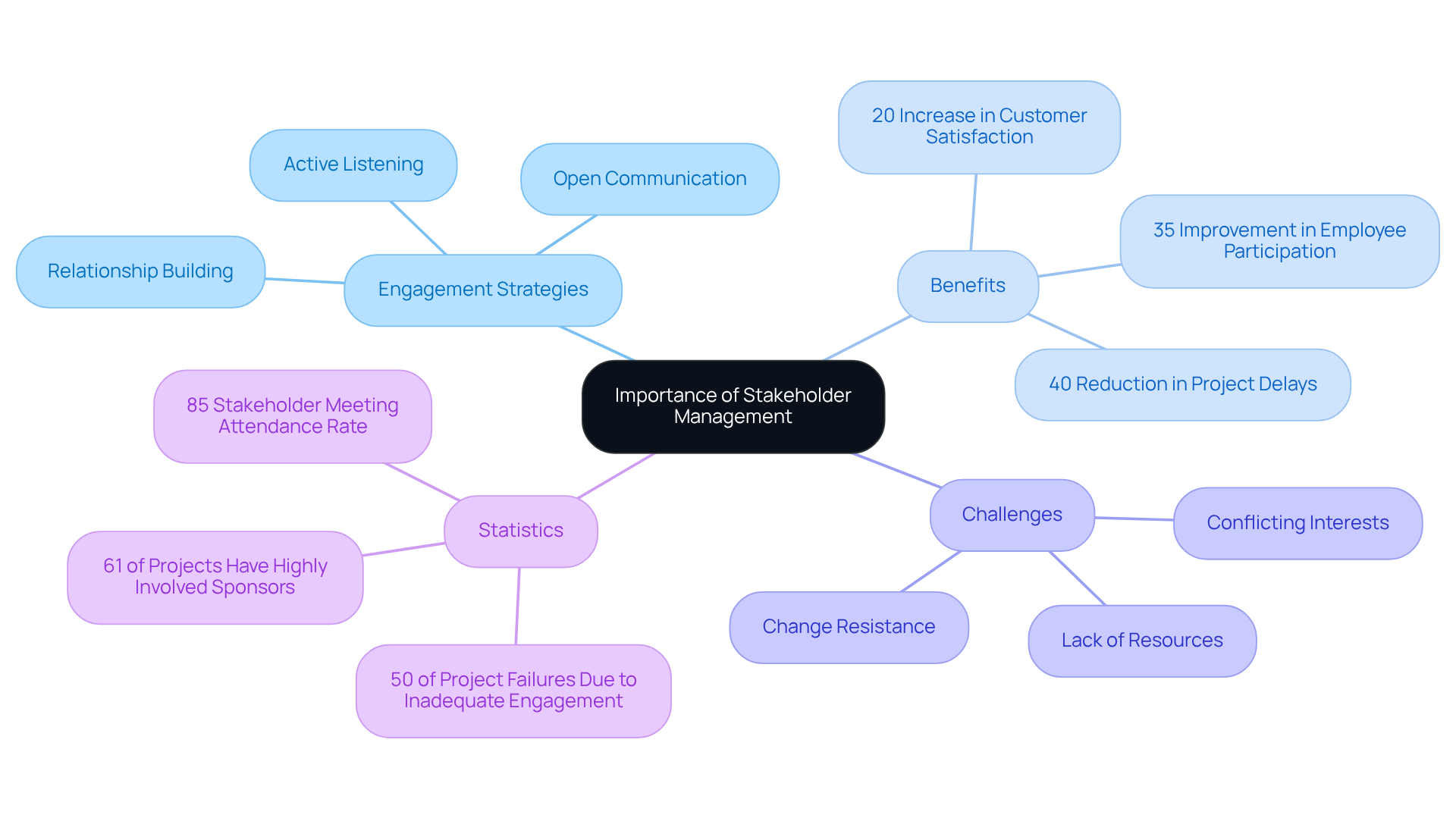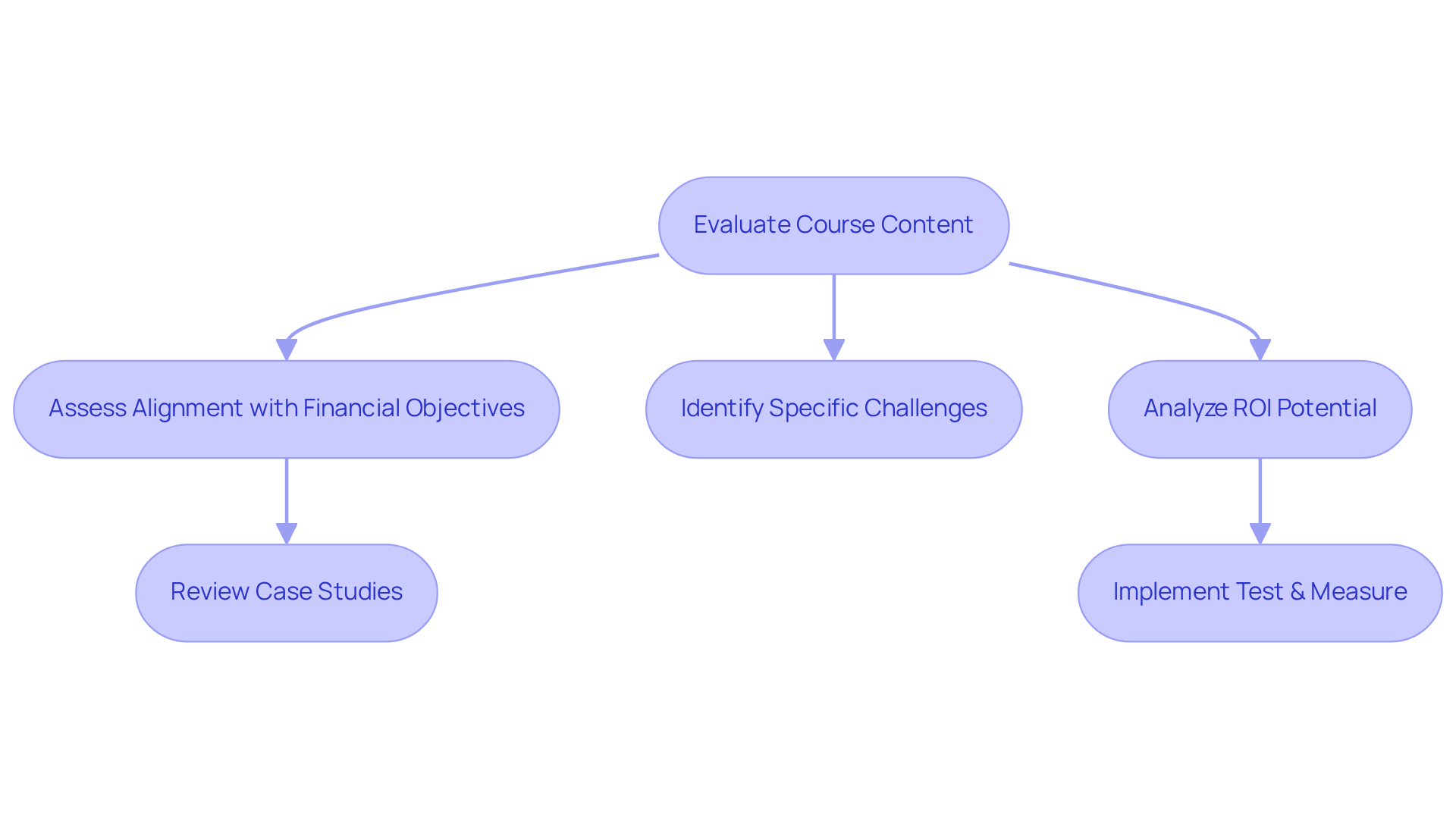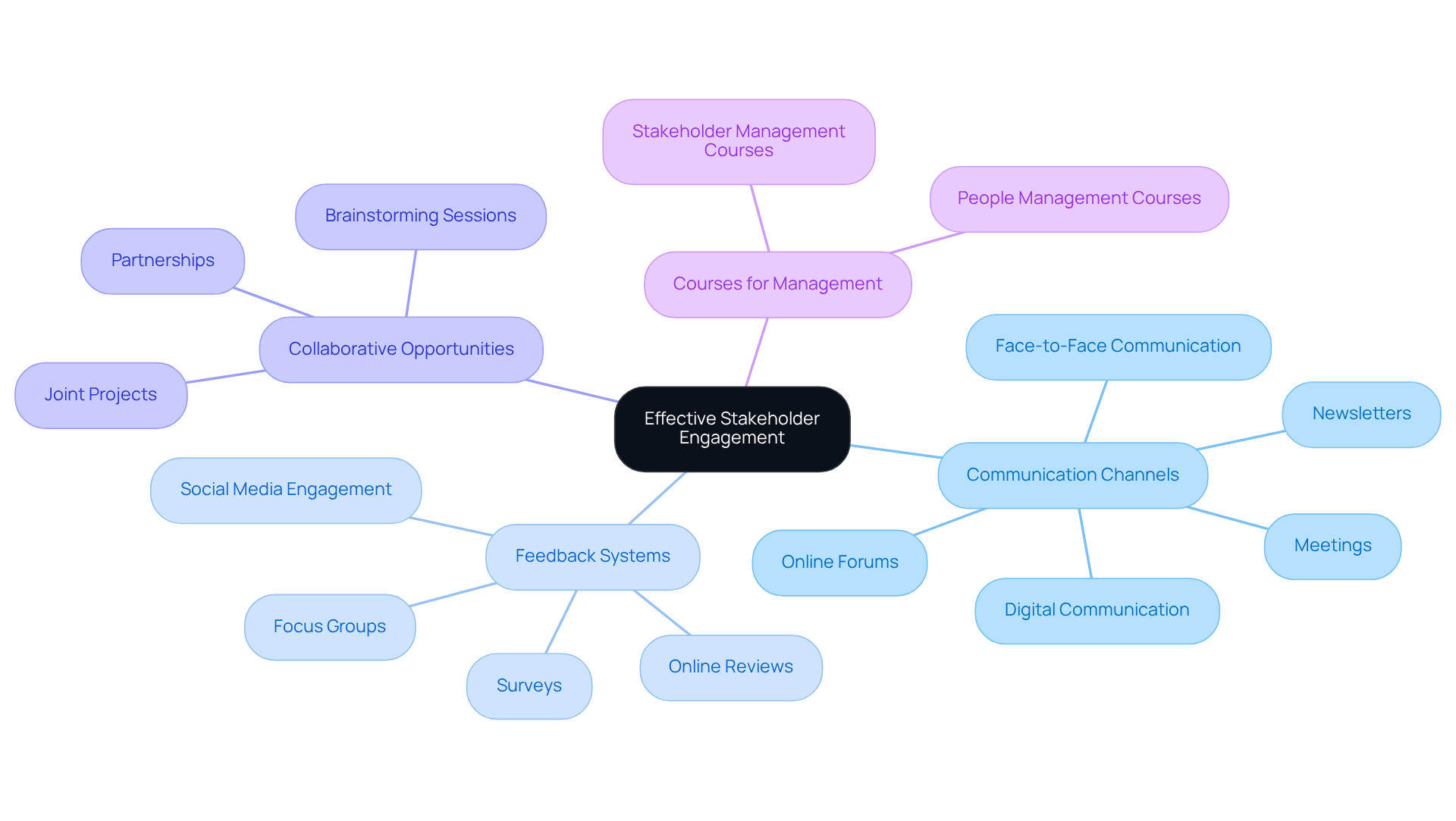Overview
This article presents three pivotal strategies for effective stakeholder and people management courses:
- Recognizing the critical role of stakeholder management
- Assessing course content in alignment with financial objectives
- Executing robust engagement strategies
These approaches are substantiated by evidence indicating that proactive stakeholder engagement fosters enhanced customer satisfaction, boosts employee participation, and ultimately drives superior financial performance for organizations. It is essential for professionals in the field to implement these strategies to realize tangible benefits.
Introduction
The landscape of business is increasingly defined by the relationships and interactions between organizations and their stakeholders. Understanding how to effectively manage these relationships is not merely beneficial; it is essential for navigating challenges and driving success. Stakeholder and people management courses offer a pathway to enhance collaboration, foster trust, and align goals, ultimately leading to improved outcomes. However, with a staggering percentage of project failures attributed to inadequate stakeholder engagement, the pressing question remains: how can organizations ensure they are truly leveraging these courses to transform their stakeholder relationships and achieve sustainable growth?
Understand the Importance of Stakeholder Management
Stakeholder and people management courses are essential for any successful business strategy, particularly in times of crisis. This process involves recognizing, examining, and engaging individuals or groups with vested interests in the entity's operations and outcomes. Effective management of these interested parties through stakeholder and people management courses aligns all individuals with the organization's objectives, promoting enhanced collaboration and support during challenging times. For example, retail companies facing financial difficulties can significantly benefit from involving suppliers and clients to gain insights into their perspectives and expectations. By fostering open communication and addressing concerns, companies can build trust and loyalty—critical components for recovery and growth.
At Transform Your Small/Medium Company, we prioritize a comprehensive review at the beginning of each client collaboration to align key participants and gain a deeper understanding of the situation beyond the numbers. This approach enables us to identify underlying issues and collaboratively devise a plan that mitigates weaknesses while bolstering strengths. Our services, including interim management and financial assessment, are tailored specifically for small to medium businesses. Current trends indicate that organizations focusing on participant engagement, by implementing stakeholder and people management courses, experience a 20% increase in customer satisfaction and a 35% improvement in employee participation. Moreover, grasping the intricacies of managing interested parties through stakeholder and people management courses enables organizations to anticipate challenges and mitigate risks, leading to more informed decision-making and strategic planning. Notably, approximately 50% of project failures stem from inadequate involvement of stakeholders, underscoring the necessity of proactive engagement. By leveraging effective engagement strategies, businesses can navigate crises more adeptly and position themselves for sustainable growth.

Evaluate Course Content and Relevance to Financial Goals
When selecting management courses for interested parties, it is essential to evaluate the material in alignment with the entity's financial objectives. This assessment involves determining whether the course content addresses the specific challenges faced by the entity and its stakeholders. For instance, a course emphasizing negotiation skills may be particularly pertinent for a business aiming to strengthen supplier relationships and cut costs. Furthermore, organizations should assess the potential return on investment (ROI) from the training. This can be achieved by analyzing how the skills gained from the course can lead to increased stakeholder engagement, higher revenue, or reduced operational expenses.
Our team is dedicated to identifying underlying business issues and collaborating to devise a strategy that mitigates weaknesses, thereby enabling the business to reinvest in its key strengths. As Anne M. Mulcahy aptly stated, 'Employees who believe that management is concerned about them as a whole person - not just an employee - are more productive.' This underscores the significance of stakeholder and people management courses in enhancing employee engagement and productivity, which directly ties back to financial objectives.
Moreover, referencing case studies such as Teamflect's Individual Development Plans (IDPs) illustrates how aligning employee aspirations with organizational goals through training can enhance performance and retention, ultimately supporting the entity's financial aims. By implementing turnaround lessons and ensuring that the content of stakeholder and people management courses aligns with financial objectives, entities can guarantee that their investment in training produces meaningful outcomes and bolsters their overall strategic goals.
To optimize this process, entities should adopt a 'Test & Measure' approach, regularly evaluating the effectiveness of the training and making necessary adjustments to maximize ROI.

Implement Strategies for Effective Stakeholder Engagement
To effectively engage interested parties, companies must implement a multifaceted strategy that aligns with their unique needs and preferences, which can be enhanced through stakeholder and people management courses. Establishing regular communication channels—such as newsletters, meetings, and online forums—ensures that stakeholder and people management courses keep stakeholders informed and actively involved in decision-making processes. Moreover, feedback systems, including surveys and focus groups, are vital for gathering insights, enabling organizations to incorporate stakeholder and people management courses into their strategic planning.
In addition, promoting collaborative opportunities through joint projects or partnerships can enhance commitment and ownership among participants. For instance, a restaurant facing operational challenges may engage its staff in brainstorming sessions to identify cost-saving strategies, thereby empowering them and fostering their dedication to the establishment's success.
By adopting these strategies, organizations can cultivate stronger relationships with stakeholders by implementing stakeholder and people management courses, ultimately leading to increased support and collaboration during periods of change.

Conclusion
Stakeholder and people management courses are crucial in shaping successful business strategies, particularly in challenging times. By effectively managing the interests of various stakeholders, organizations can align their objectives, enhance collaboration, and foster loyalty, ultimately leading to sustainable growth and recovery.
The article emphasizes the importance of:
- Understanding stakeholder dynamics
- Evaluating course content in relation to financial goals
- Implementing effective engagement strategies
Key insights highlight the necessity of:
- Proactive stakeholder involvement to mitigate risks
- Alignment of training programs with organizational objectives
- Fostering open communication and collaboration to build trust and commitment
In summary, prioritizing stakeholder and people management is not merely a beneficial practice; it is essential for any organization aiming for long-term success. By investing in relevant training and actively engaging stakeholders, businesses can navigate crises more effectively and position themselves for future opportunities. Embracing these strategies will not only enhance stakeholder relations but also drive financial performance, making it imperative for organizations to integrate these practices into their core operations.
Frequently Asked Questions
Why is stakeholder management important for businesses?
Stakeholder management is crucial for aligning individuals with an organization's objectives, enhancing collaboration and support, especially during crises. It helps businesses recognize and engage those with vested interests in their operations, which can lead to improved outcomes.
How can stakeholder management benefit retail companies during financial difficulties?
Retail companies can benefit by involving suppliers and clients to gain insights into their perspectives and expectations, fostering open communication, and addressing concerns. This builds trust and loyalty, which are essential for recovery and growth.
What approach does Transform Your Small/Medium Company take in client collaborations?
They prioritize a comprehensive review at the beginning of each collaboration to align key participants and understand the situation beyond the numbers. This helps identify underlying issues and collaboratively devise plans to mitigate weaknesses while enhancing strengths.
What services does Transform Your Small/Medium Company offer?
They offer services such as interim management and financial assessment, specifically tailored for small to medium businesses.
What are the current trends regarding stakeholder engagement?
Organizations that focus on participant engagement through stakeholder and people management courses experience a 20% increase in customer satisfaction and a 35% improvement in employee participation.
How does understanding stakeholder management impact decision-making?
Grasping the intricacies of managing interested parties enables organizations to anticipate challenges and mitigate risks, leading to more informed decision-making and strategic planning.
What statistic highlights the importance of stakeholder involvement in projects?
Approximately 50% of project failures stem from inadequate involvement of stakeholders, emphasizing the necessity of proactive engagement.
How can effective engagement strategies help businesses during crises?
Effective engagement strategies allow businesses to navigate crises more adeptly and position themselves for sustainable growth by fostering collaboration and trust among stakeholders.




